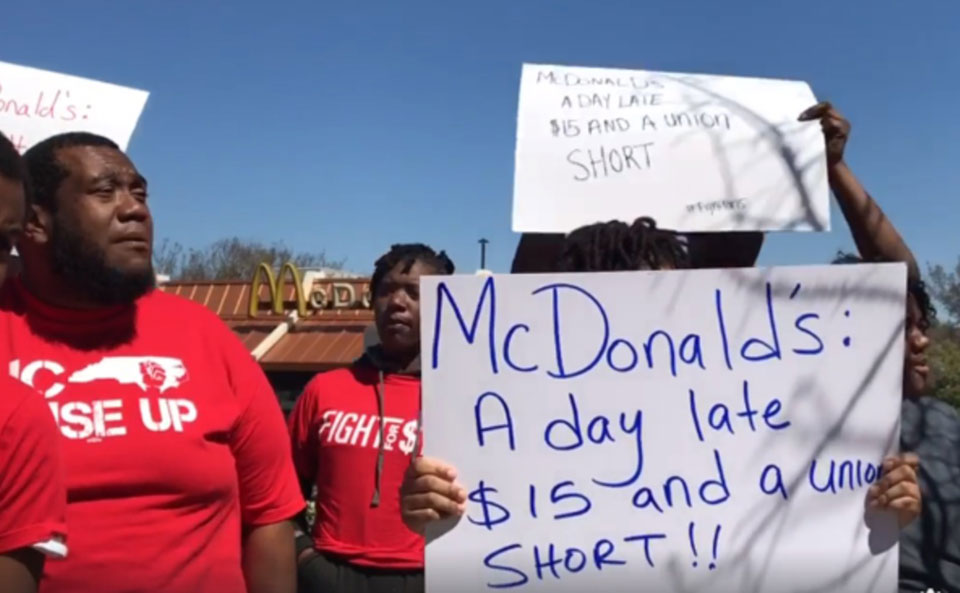
WASHINGTON – Workers and their allies are laying the groundwork for a long, costly and probably bloody – well, not literally – battle to achieve true labor law reform in the U.S.
Their vehicle is the PRO Act, the comprehensive labor law reform legislation which pro-worker lawmakers, acting in concert with the AFL-CIO Legislative Affairs Department and unions’ legislative directors, put together and introduced earlier this year.
The PRO Act may get through the Democratic-run House during the 116th Congress, but then it will die on the doorstep of Senate Majority Leader Mitch McConnell, R-Kent., along with virtually every other piece of progressive legislation, from raising the minimum wage to Medicare for All to the Green New Deal.
McConnell labels all of the measures “socialism.” He tries to resuscitate the post-World War II Red Scare by tying labor law reform and all the rest to congressional Democrats whom he libels as extremists, communists or both: Sen. Bernie Sanders of Vermont, Reps. Alexandria Ocasio-Cortez of New York City, Ilhan Omar of Minneapolis, Rashida Tlaib of Detroit and Ayanna Presley of Boston.
(It is no coincidence that McConnell’s targets are all minorities and he’s an old white guy. The four woman lawmakers are people of color. Sanders is Jewish. This is called scapegoating.)
But that isn’t stopping workers and their allies from drafting the most-comprehensive and most worker-friendly rewrite of labor law since the original National Labor Relations Act of 1935. Every major labor law rewrite since then has either weakened it, as GOP-passed Taft-Hartley did in 1947 and GOP-passed Landrum-Griffin did in 1959 or has not been as wide-ranging as the PRO Act.
And that latter criticism applies to the Employee Free Choice Act a decade ago, when the Democratic Obama administration didn’t push hard for it, no matter what Obama’s Vice President, Joe Biden, says on the campaign trail in his race for the 2020 Democratic presidential nomination.
So what would the PRO Act legalize? The details include, but are not limited to:
— Expanding the law to cover many uncovered workers. Both farmworkers and home health care workers, both excluded from the NLRA in 1935 because FDR needed Southern segregationists’ votes to get it through. Home health care workers, then and now, were usually women of color. Farmworkers overwhelmingly speak Spanish. The Southerners hated, and feared, having those groups join white workers, their natural allies, in union organizing drives.
— Strengthening the right to organize by outlawing many of the dodges, delays and outright illegal tactics bosses now use to frustrate unionization drives. That includes mandated company neutrality in organizing drives and curbs on union-busters. And back those bans with real fines against bosses and employers – including CEOs and corporate boards – that really hit them in the wallet, plus automatic injunctions reinstating illegally fired workers immediately.
— Interestingly, the PRO Act does not include writing card check recognition, which the NLRB first recognized in 1962, permanently into labor law. The GOP has tried for years to make it illegal.
— Repeal of Taft-Hartley’s infamous section 14(B), which legalizes so-called state “right to work” laws. The PRO Act also repeals the Taft-Hartley ban on so-called “secondary boycotts.” And it restores fair share fees public employee unions can charge to “free riders.” Now, thanks to the right-wing/business-backed Janus decision, public worker “free riders” are really free riders – able to use union benefits and protections without paying one red cent for them – nationwide.
— Write into law provisions saying that both a corporate headquarters and its local franchise – think McDonald’s management brass and your local McDonald’s – are “joint employers” and thus jointly responsible for obeying, or breaking, labor law.
— Mandatory impartial arbitration between unionized workers and their bosses if, after the union is recognized in the workplace, the two sides can’t agree on a first contract within a few months. Too often now, even when the union wins the right to represent workers, the bosses refuse to bargain at all, stall, or both, hoping to wear the union down and wear the workers out, leading to supposedly spontaneous “decertification” efforts.
But the fireworks over the PRO Act in this Congress are strictly a prelude for what will happen after the 2020 election – and that in turn depends on the outcome of the election.
If pro-worker forces hold the U.S. House and take back both the White House and the Senate, expect a huge ideological war over labor law reform in general and the PRO Act in particular.
That’s what happened in 2009. The corporate class and their right-wing allies mounted such an enormous propaganda campaign against the much-weaker Employee Free Choice Act that the Obama administration pushed it aside in favor of the Affordable Care Act. Obama spent all his political capital on that and on hauling the U.S. out of the business/financier-caused Great Recession.
It didn’t help that the filibuster-proof 60-vote Senate Democratic majority disappeared that year when Senate Labor Committee Chairman Edward Kennedy, D-Mass., died – or that it was Kennedy in particular who died. The veteran Democrat was widely acknowledged, in both parties, as probably the most-effective actual legislator, as opposed to grandstander, the Senate had seen in years. And he was committed to both the ACA and the Employee Free Choice Act.
Expect an even more-enormous right-wing/business scare campaign, fueled by hundreds of millions of dollars in corporate and GOP “dark money” unleashed by the Supreme Court’s GOP-named majority in the 2010 Citizens United ruling, to be marshaled against workers and their rights.
That’s why this year is devoted to laying the groundwork for labor law reform, both electorally and at the ballot box.
If on Jan. 3, 2021, at the start of the 117th Congress, Mitch McConnell is still Senate majority leader, the PRO Act is dead. Or if, at 12:01 pm on Jan. 20, 2021, Donald Trump is still president of the United States, the PRO Act – along with a lot of other progressive and pro-worker legislation – is dead.
So the PRO Act/labor law reform fight groundwork is two-fold. And the more important fight will be for the hearts and minds of the U.S. population on and before Nov. 3, 2020.










